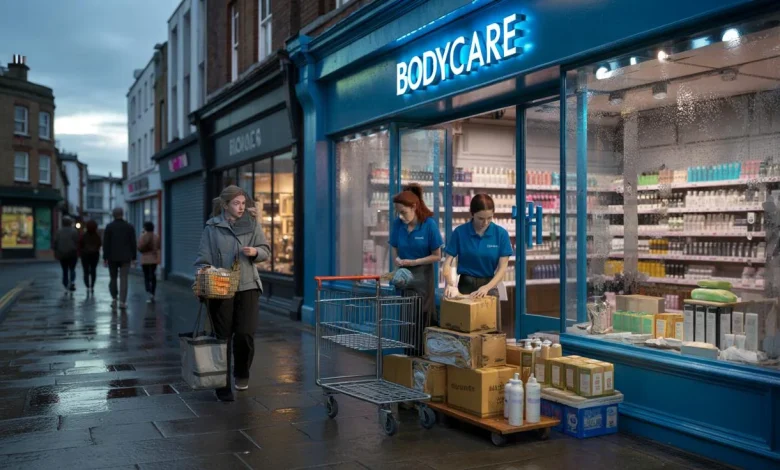High street beauty blow for shoppers: will 32 Bodycare stores shut and 450 jobs go — is yours?

Beauty fans noticed empty shelves and shorter queues this week, and whispers grew about a much-loved name on the high street.
The retailer Bodycare has entered administration, with 32 store closures planned and about 450 roles at risk as Interpath Advisory hunts for a buyer. Most remaining outlets continue to trade today, but the race is on to stabilise cash, rebuild stock, and reassure customers who still rely on cheap toiletries and everyday beauty staples.
What has happened
Administrators from Interpath have taken control of Bodycare after a crunch in cash and confidence. The business faces a shrinking store estate, with 32 locations earmarked for closure. That move affects hundreds of workers across the UK, while the balance of the 1,500-strong workforce stays in post to keep trading and support a potential rescue sale.
32 shops are set to close, with around 450 redundancies expected, while most stores remain open during the sale process.
Interpath is running a rapid assessment of the chain’s finances and stock cover. The firm is inviting interest from potential buyers, including rivals and private investors. A solvent sale of part or all of the business remains possible, although timings are tight and the trading backdrop is hostile.
Why the numbers stopped adding up
Rising operational costs cut into margins. Energy bills surged across retail. Wages rose under the latest National Living Wage uplift. Rents and business rates remain stubborn. These pressures collide with a customer base squeezed by the cost of living, which pushes shoppers to trade down or delay non-essentials.
Management also grappled with a late shift online. The digital platform overhaul ran behind schedule, dragging on sales growth and raising costs for development and fulfilment. Online-only rivals gained ground during the delay.
A funding gap formed after a planned stock market listing fell through last year. That decision removed a route to fresh capital. Suppliers then tightened terms. Insurance on trade credit thinned. Stock levels suffered, and some shelves looked patchy in recent weeks as inbound flows slowed.
Rising costs, a delayed online transition and a failed listing last year created a funding gap that strained supplier confidence.
What this means for shoppers
Most Bodycare stores are trading as normal today. Administrators often keep tills running to preserve value. That said, a few rules change once a company enters administration, so shoppers should act with care.
- Gift cards: spend them soon while stores remain open. Administrators can restrict or suspend redemption without notice.
- Refunds and exchanges: policies may change. Keep receipts and act quickly if you need to return an item.
- Outstanding orders: collect click-and-collect purchases promptly. For delivery orders, track progress and contact the store if delayed.
- Faulty goods: your rights under the Consumer Rights Act still apply. A chargeback or Section 75 claim may help if the retailer cannot process refunds.
- Payment method: use a credit card for larger purchases. You gain extra protection if anything goes wrong.
If you hold a gift card, use it while the doors are open. Redemption can end without warning in an administration.
What this means for staff
About 450 roles are expected to go as 32 shops close. The wider workforce of around 1,500 remains in post while trading continues. Staff facing redundancy may qualify for statutory notice pay, accrued holiday pay, and statutory redundancy pay via the Insolvency Service. Keep payslips and contracts to hand, and register claims as soon as instructed by the administrators.
Recruiters say front-of-house retail skills are in demand ahead of the Christmas peak. Candidates should refresh CVs, gather references, and make clear experience with tills, cash handling, stockroom work, and customer care.
Can Bodycare be saved?
Administration buys time. The aim is to rescue the company as a going concern, or deliver a better outcome for creditors than a liquidation. A buyer could take the brand, the online assets, and a cut-down store estate. A pre-pack sale is possible if offers arrive quickly. Landlords may be asked for rent resets to keep key stores viable.
Rivals will watch with interest. Boots and Superdrug dominate health and beauty on the high street, while supermarkets pull shoppers in with keen prices. Pure-play online sellers erode margins across fragrances, skincare, and everyday toiletries. Any buyer must back a tight plan: fewer stores, faster ranges, sharper prices, and a digital front door that actually converts.
Key point
Detail
Stores set to close
32
Jobs affected
About 450
Total workforce
Circa 1,500
Administrator
Interpath Advisory
Main factors cited
Rising costs, delayed online shift, cost-of-living squeeze, failed stock market float
What happens next
Expect a short marketing process for the assets. Interpath will field bids and triage interest. If a buyer emerges, the brand could continue with fewer sites and a rebuilt website. If no deal lands, further closures would follow and a wind-down could start. Suppliers and landlords will press for clarity on terms before the key Christmas trading period.
How to check your local store
Check in-store notices for closure dates and changes to opening hours. Speak to staff about gift card policy on the day you plan to spend. Follow the company’s social feeds for store lists and updates. Administrators usually release phased announcements as decisions are made.
Prices, stock and what to expect at the till
Stock levels can be uneven during administration. Fresh deliveries may be lighter while suppliers wait for assurances. Prices can move, and promotions may be pulled at short notice. Clearance tags may appear in branches slated to close. Keep an eye on use-by dates for consumables, and check that electricals carry the required safety marks and guarantees.
Wider context: why high street health and beauty is under pressure
Shoppers have become more price sensitive. They search for value, buy less frequently, and switch to own-label where possible. Online rivals ship direct from central hubs, trimming costs. A mid-sized high street chain faces a squeeze from both sides: the fixed costs of physical retail and the relentless pricing of e-commerce.
There is still a path to profit. Smaller, well-sited stores near transport hubs can work. Click-and-collect cuts delivery costs and drives add-on sales. A focused range, data-led replenishment, and quick supplier settlements help keep shelves full without bloating inventory.
Practical tips for consumers
- Need shampoo, deodorant or toothpaste this week? Buy what you need now rather than waiting for a sale that may not arrive.
- Keep paper receipts and email order confirmations. Photograph them in case you lose the originals.
- If you spot a clearance sticker, check that the product seal is intact and the packaging is undamaged.
- Pay by credit card for anything over £100 to enable a Section 75 claim if required.
- If a branch closes, ask staff how to redeem gift cards in nearby stores while trading continues.
Administration is a process, not an ending. A trimmed estate and a stronger website could still give the brand a future.
For readers comparing costs, a simple basket tells the story. A family spends around £15 a week on toiletries and bathroom basics. Switching a few lines to own-label can trim that to £12. Multi-packs and refill pouches add further savings. Small changes ease pressure while the market resets.
Retail watchers will track whether Bodycare secures fresh backing and a credible digital relaunch. The response from suppliers, shoppers and landlords in the next four weeks will decide how much of the chain, and how many jobs, can be kept alive on the British high street.





